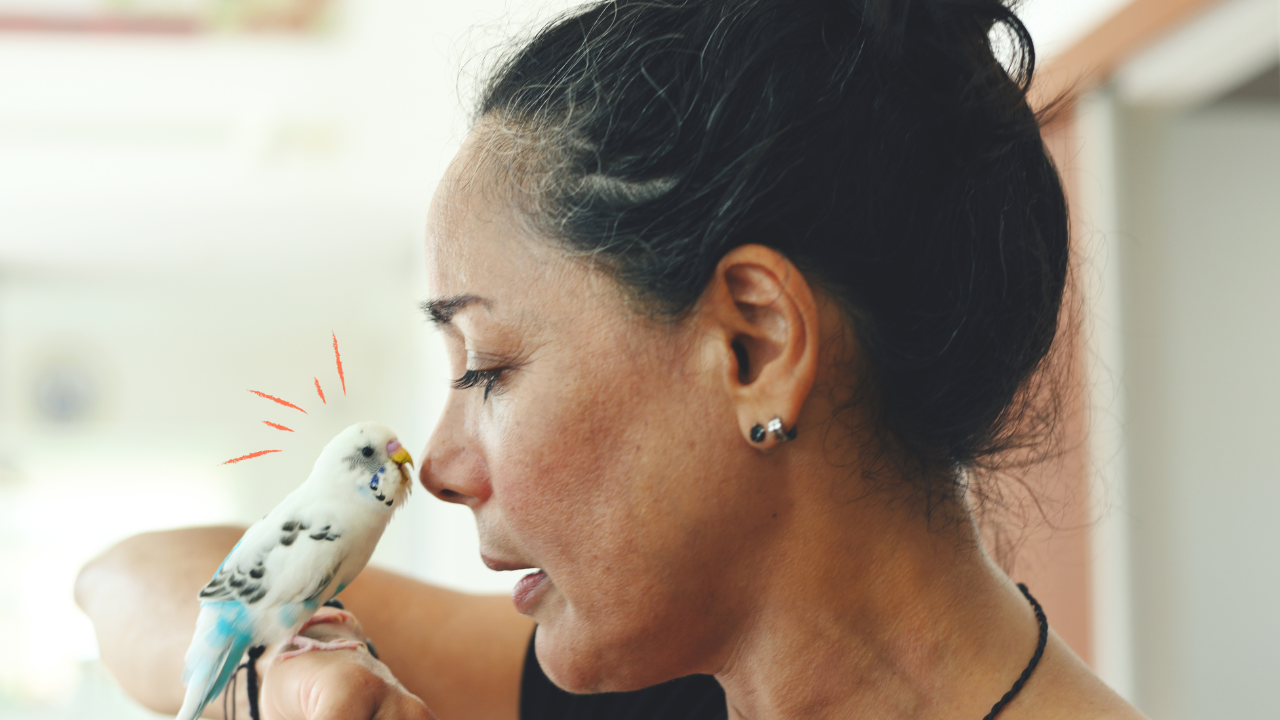By Diane Burroughs
Revised 7/29/2023
Table of Contents
- Why you should microchip your pet
- How microchipping your pet works
- The benefits of microchipping your pet
- The process of microchipping a bird
- What to do if you have a lost bird
It is heartbreaking to lose a pet, especially when it is a beloved bird. Sadly, every year there are thousands of birds that go missing and are never found. As a pet owner, one of the best things you can do to increase the chance of finding a lost bird is to microchip your pet. Microchipping your pet is a simple and cost-effective procedure that can make it much easier to recover a stolen or lost bird. In this blog post, we will discuss the importance of microchipping your pet to help find a lost bird.
Why you should microchip your pet
Losing a pet can be a heartbreaking experience for any pet owner, especially if the lost pet is a bird. Birds are known for their ability to fly and explore, which makes it easy for them to get lost. This is why it's important to microchip your pet, as it can help in finding a lost bird.
Another concern for pet bird owners is the possibility of their pet being stolen. Unfortunately, birds are a prime target for theft due to their high value. In the event that your bird is stolen, having a microchip can significantly increase the chances of it being found and returned to you. Don't wait until it's too late - microchip your pet today to ensure the safety and well-being of your beloved lost bird.
A third reason why it is so important to microchip your bird is because there is little variation in appearance of a particular species that people can easily detect. After all, most Congo African Grey's looks very much alike. A registered microchip is proof that you are the owner.
How microchipping your pet works
Microchipping is a quick and easy process that can provide peace of mind to pet owners. A tiny, rice-sized microchip is implanted under the skin of the bird, typically on the back between the wings. The microchip contains a unique identification number that can be scanned by a special reader to retrieve the owner's contact information.
The procedure of microchipping a bird typically takes only a few minutes and can be done by a veterinarian or trained animal care professional. It is relatively painless, as the bird will only feel a small pinch during the insertion of the microchip. Once the microchip is inserted, the bird may experience minor discomfort for a short period but will quickly recover.
The microchip can last for the bird's lifetime, so there is no need to worry about replacing it. However, it is essential to register your pet microchip to ensure that your contact information is up to date and readily available in case your bird ever becomes a lost pet bird. Don't forget to update your registry if you ever move.

Overall, microchipping your bird is a simple yet effective way to increase your chances of finding your lost pet bird. It provides a reliable method of identification that can help reunite you with your beloved pet quickly.
The benefits of microchipping your pet
1. Permanent identification: When you microchip your pet, the chip will provide permanent identification that cannot be removed or lost. Unlike traditional tags or collars that can fall off, microchipping ensures that your pet's identification is always with them.
2. Increased chances of being reunited: If your pet goes missing, having a microchip greatly increases the chances of being reunited with them. Shelters and veterinary clinics are equipped with microchip scanners, and if your pet is found, they can easily scan for the chip and contact you.
3. Quick and easy process: Microchipping your pet is a quick and easy process that can be done by a veterinarian. The microchip is about the size of a grain of rice and is inserted under your pet's skin with a needle.
4. Cost-effective: Microchipping your pet is a one-time cost that provides a lifetime of identification. Compared to the cost of continually replacing lost tags or collars, microchipping is a cost-effective solution.
5. Peace of mind: By microchipping your pet, you have the peace of mind of knowing that you have taken all necessary steps to ensure their safe return if they ever go missing. This can provide comfort during stressful situations and make it easier to focus on fin
The process of microchipping a bird
Microchipping a bird should be done by a veterinarian or an experienced avian specialist. The process is quick and relatively painless for the bird. A small, electronic microchip is injected into the bird's skin using a needle. The microchip is about the size of a grain of rice and contains a unique identification number that is registered to the bird's owner.
The procedure takes only a few minutes, and the bird can return to normal activities immediately after. However, it's essential to keep an eye on the bird and check the microchip site for any signs of infection or irritation.
Once the microchip is implanted, it's important to register your pet's microchip with a reputable registry, which stores your contact information alongside the bird's unique identification number. This information can be accessed by animal shelters, veterinarians, and rescue organizations. Aftercare is minimal, but it's important to keep the microchip site clean and avoid any activities that may cause irritation or damage to the area until the minor wound has healed.
What to do if you have a lost bird
Losing a pet can be a very scary experience, so it's best to prepare in advance by having your bird microchipped and leg band numbers readily available. Always make sure that your pet's microchip number has been registered and that your vet knows the number. This includes identifying information such as your bird's breed and any distinctive features.
Plan you have a pre-made flier on hand that you can print and distribute quickly. In the heat of the moment when you first realize your bird is missing you may be so distraught that you're not thinking clearly. Furthermore, this is the best time to locate your bird. You don't have to "reinvent the wheel." Just head straight over to GoodBirdInc.com to customize some pre-designed fliers and print out resources to help you locate your missing pet faster, should the need arise.
Once you realize your bird is missing, it's important to act fast. Pull out the missing pet flier with a recent photo of your lost bird and distribute it in your local area. Use the distribution log to help you remember the numerous places that you should place the flier. Additionally, there are several websites dedicated to lost bird recovery that you can utilize.
There are five helpful methods for recovering a lost bird:
1. Set its cage outside with food. Set a bird cage outside with some preferred foods & treats, like millet spray, nuts, seeds, and so on.
2. Call your bird. If you have established a bird call with it, which is highly recommended, make a recording of it and play it outside constantly.
3. Utilize social media to spread the word about your lost bird. The Nextdoor App is a great resource.
4. Put posters up around the neighborhood with pictures of your bird, contact information, and reward.
5. Contact local bird rescue organizations, all veterinarians, and animal shelters to see if they have found your bird.
Remember to never give up hope and keep searching for your lost pet bird. Microchipping can significantly increase your chances of being reunited with your beloved companion.
In Conclusion...
Microchipping your pet is a crucial step in increasing the chances of finding your lost bird. By registering your pet microchip and ensuring your contact information is up to date, you provide a reliable method of identification that can lead to a quick reunion with your beloved companion.
Losing a pet can be a heartbreaking experience, but microchipping offers peace of mind, knowing that you have taken all necessary steps to ensure their safe return. The permanent identification provided by a microchip cannot be lost or removed, unlike traditional tags or collars. It remains with your pet for their lifetime, providing a constant link to you as their owner.
In the event that your bird goes missing, shelters, veterinary clinics, and rescue organizations equipped with microchip scanners can easily scan for the chip and contact you. This greatly increases the chances of being reunited with your lost pet bird.
So, don't delay any further. Take the responsible step of microchipping your pet today. It's a quick and easy procedure that offers long-lasting benefits. Register your pet's microchip and keep your contact information updated to ensure a smooth recovery process if your bird ever becomes lost. By taking these precautions, you give yourself the best possible chance of being reunited with your feathered friend and finding comfort in knowing that you've done everything you can to keep them safe.
Related Posts:
7 Valuable Lessons From and "Almost" Lost Pet
References:
Get Your Bird Back: What To Do When Your Parrot Is Lost
Lost Parrot Emergency Guide: How to Find and Catch an Escaped Parrot
Found a Lost Pet Bird? Here's What To Do
Link to this blog
https://birdsupplies.com/blogs/news/microchip-your-pet-to-help-find-your-lost-bird
Diane Burroughs, LCSW is a licensed psychotherapist trained in ABA therapy techniques. She specializes in avian anxiety disorders and is certified in Nutrition For Mental Health. Diane has written a number of bird behavior books and she offers behavior consultations. She's developed a range of UnRuffledRx Science-backed Parrot Wellness Supplies.
Diane's products have been featured in the Journal of Avian Medicine and Surgery and at Exoticscon, a conference for exotic pet veterinarians. Her bird collars & supplements are stocked in avian vet clinics and bird stores throughout the US. With over 30 years in the field of behavior, Diane has created thousands of successful individualized behavior plans that help pets thrive.
TAGS: #BirdStress #BirdSelfMutilation
SHARING IS CARING! PLEASE SHARE ON YOUR FAVORITE SOCIAL MEDIA NOW!




